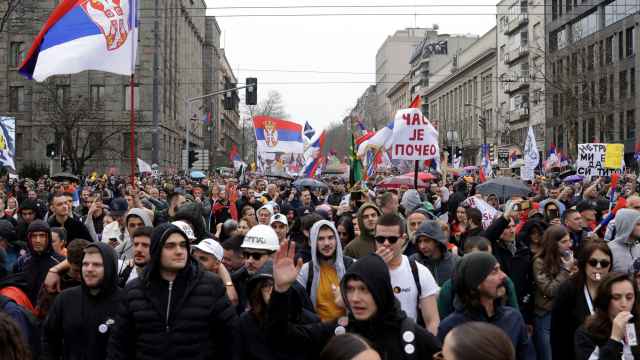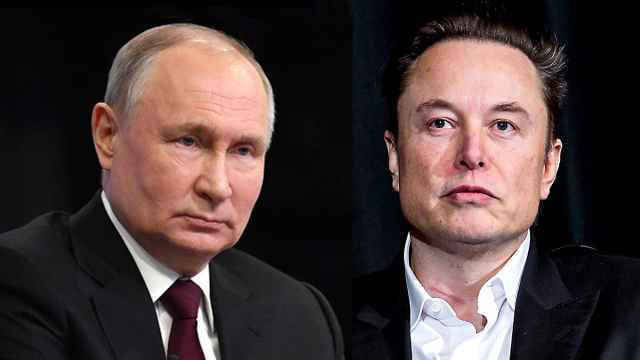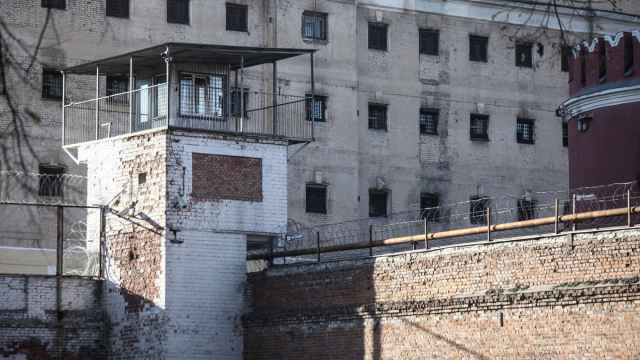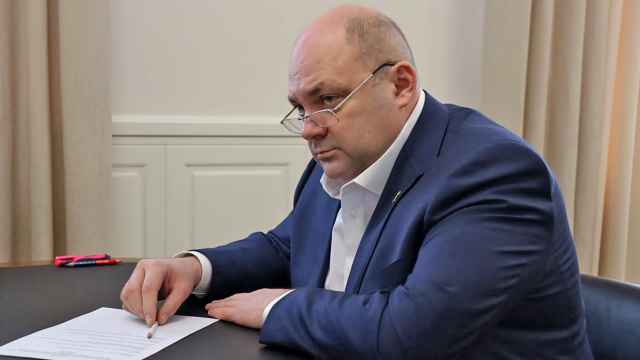Last week, the annual Gaidar Forum took place at the Academy of the National Economy and Public Administration in Moscow. Admirably, the academy's rector, Vladimir Mau, attracted most ministers and the cream of Russia's intelligentsia into interesting panel debates.
This year's forum was titled "Russia and the World: Challenges and Integration." I was most struck by a panel on political trends that featured nine prominent Russian pundits. Their pessimism was overwhelming. Most expected no change this year, at least not for the better. President Vladimir Putin did win the presidential election last March, and the popular protests have largely faded, while the economy is doing pretty well. The increasingly reactionary regime is based on personal authoritarianism. It has gradually reinforced repression and thrives on anti-Americanism, but it enjoys solid support from the state bureaucracy, siloviki, big business and the provinces. The opposition may be supported by one-fifth of the population, but it is fragmented and weak.
Yet during one session at the forum, Novaya Gazeta journalist Andrei Kolesnikov appealed, "Do not underestimate the unpredictable!" Moderator Leonid Gozman, an opposition leader, underscored that the regime appears to be exhausted and at a dead end, saying: "The government does not even say anything good about itself. It only slanders the opposition."
Indeed, the Kremlin faces many risks this year. Its fundamental weakness is the dominance by a corrupt state apparatus that rules in its own interests and with impunity. Here are the top nine risks facing the Kremlin:
1. Oil prices may finally fall, as many leading financial analysts and banks predict. Global oil prices have been high since the end of 2003. The last time they stayed high was from 1973 to 1981. Then they fell steadily for five years, which destabilized the regime under Soviet leader Leonid Brezhnev. The time for an adjustment may be ripe.
2. The regime is completely dependent on one person: Putin. If anything happens to him, the system will be destabilized. Bizarre recent decisions, such as Rosneft's purchase of the highly profitable and well-managed TNK-BP, at great expense to the state, or the large, value-destructive Gazprom investment, raise questions whether he really is in control or only out of his mind.
3. Regimes with such extraordinary top-level corruption are not stable. Huge wealth is transferred to top officials. Corruption renders the state dysfunctional. Sooner or later, people will protest, and we cannot predict when.
4. In late 2012, Putin launched his first significant anti-corruption campaign. One indication that the elites are scared is the sharp increase over the past year in the number of luxury villas on Rublyovskoye Shosse that has been put on sale. Meanwhile, ordinary people are getting enraged by the massive corruption within the government. In each of the six current corruption cases involving more than $100 million, one top official goes after another one, reflecting a wild interclan feud. This underscores the weakness of law and order. Putin's Catch-22 is best illustrated with former Defense Minister Anatoly Serdyukov. If Serdyukov is convicted and sent to prison, the corrupt elites will rebel. If he is acquitted, the population will protest.
5. The regime's new reactionary radicalism has put itself in danger. Previously, Putin was a master of political safety valves, but now he is plugging them, raising the risk of unexpected explosions. Every protest seems to be encountered with more repression, which is rarely optimal. The regime has developed a strong instinct to do the opposite of the rational.
6. Similarly, the anti-American campaign that started in connection with the State Duma elections in December 2011 is just getting worse. To judge from the official propaganda, Putin harbors the illusion that U.S. President Barack Obama intends to start an Orange-style revolution in Russia to oust him. In addition, anti-Americanism enjoys popular support in the regions. If this continues, the scaling back of U.S.-Russian cooperation will be inevitable. Why should Obama go out of his way to mend ties with a person who persistently campaigns against him and even skipped out on the Group of Eight meeting at Camp David in May? Obama has apparently turned down Putin's invitation to meet in Moscow this spring, and the question will inevitably rise whether Obama will go to the G20 summit in St. Petersburg in September. Putin's relations with the other G8 leaders are hardly better. Such foreign policy aggression is always imprudent, but particularly for the chairman of the G20. Putin runs the risk of losing face on a global scale.
7. With the return of Putin as president, Russia's relations with its post-Soviet neighbors have deteriorated to a dangerous low. Last time he was president, his aggressive neighborhood policy led to a war in Georgia in August 2008. There is an old, dangerous Russian myth stated by tsarist Interior Minister Vyacheslav von Plehve before the disastrous Russo-Japanese war in 1904: "We need a small, victorious war." No war is on the horizon, but with unresolved post-Soviet conflicts and persistent Islamic terrorist threats, new military actions cannot be excluded.
8. Putin's leading slogan in his state-of-the-nation address in December was "deoffshoreization." Demands for honest declarations of purchases of luxury residences abroad and for the prohibition of foreign bank accounts have aroused great concerns among the state elites. It is an open question how far this policy will go, but it is already destabilizing the regime.
9. Finally, as the internal top struggle is clearly intensifying, a coup in the Kremlin cannot be excluded, especially since the most important combatants draw from the siloviki. If they consider Putin ineffective or weak, they might opt for a coup. Remember the August 1991 putsch.
Although there are many risks facing Russia, we should not forget positive factors, although they pale in comparison. Macroeconomic data remain stellar, and international reserves are huge. Russia's human capital is talented, and higher education is gradually being reformed. Accession to the World Trade Organization should speed up international economic integration and foreign direct investment. The euro crisis has abated, which may improve demand for Russian oil. But this will likely be offset by the shale gas revolution and Gazprom's dysfunction.
A year ago, revitalizing economic and political reforms appeared likely, but that is no longer the case. Under such circumstances, the unpredictable may suddenly happen.
Anders Åslund is a senior fellow at the Peterson Institute for International Economics in Washington.
Related articles:
A Message from The Moscow Times:
Dear readers,
We are facing unprecedented challenges. Russia's Prosecutor General's Office has designated The Moscow Times as an "undesirable" organization, criminalizing our work and putting our staff at risk of prosecution. This follows our earlier unjust labeling as a "foreign agent."
These actions are direct attempts to silence independent journalism in Russia. The authorities claim our work "discredits the decisions of the Russian leadership." We see things differently: we strive to provide accurate, unbiased reporting on Russia.
We, the journalists of The Moscow Times, refuse to be silenced. But to continue our work, we need your help.
Your support, no matter how small, makes a world of difference. If you can, please support us monthly starting from just $2. It's quick to set up, and every contribution makes a significant impact.
By supporting The Moscow Times, you're defending open, independent journalism in the face of repression. Thank you for standing with us.
Remind me later.






